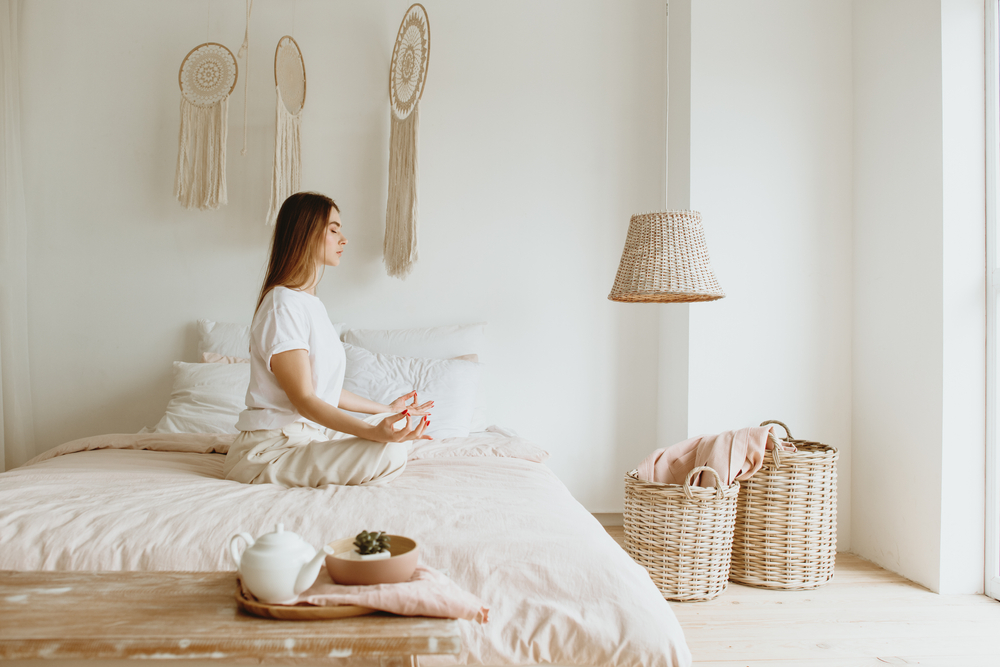If you’ve been struggling with your anxiety in these incredibly uncertain times then you really are not alone. The pandemic has touched every person on the planet in more ways than one and it’s turned our daily life completely upside down. The mental health implications on top of the obvious physical health concerns have taken many people by surprise and many scientists and medical professionals are speaking up about their concerns on the effects of coronavirus on people’s mental health in the long run. If you’ve been feeling more anxious and want to dig deeper into what anxiety actually is, why we get anxious and learn some helpful coping mechanisms then here are some top tips Holli Rubin, Psychotherapist and Head of Personal WellBeing at The Soke, London’s new (oh so stylish) cognitive health centre.
Why do we get anxious… is it a protective mechanism or a physiological response?
Anxiety is a perfectly normal physiological and emotional response to have when we are confronted with a situation that we deem threatening. Anxiety alerts us to the fact that something is wrong. Each of us have different thresholds for what we consider to be ‘threatening’.
Unfortunately, it seems like anything can tip us over the edge these days. With all the uncertainty we are having to cope with, we are responding to things more reactively, and our anxiety has increased exponentially. Being in a state of perpetual high alert, our bodies are in a constant state of fight or flight.
When a negative trigger presents itself, whatever that might be, anxiety often seems to be the default emotion. What goes on in our brains at the moment? Is it a sign of weakness?
Our response to stress has become more intense, and that was the case even before coronavirus. Our bodies react by creating more cortisol in our brains alerting us of the danger and throwing us into a state of fight or flight.
What do we mean when we say we are “ anxious? Is it really “ Anxiety “ or are we just now more aware of our emotions?
The terminology used to describe some of the symptoms can be confusing. It’s important to be be mindful of the language we use when describing our emotions.
Anxiety is regarded as a long term condition characterised by a state of stress, worried thoughts and overall tension. There are many levels and degrees of anxiety – from having nerves and jitters, or in more extreme cases having a physical response such as a stomach ache, sweating, feeling faint, feeling restless or irritated.
Everybody has things that concern them, and how they react is unique to them. Take a common thing that can cause us all worry such as doing an exam. It’s normal to feel stressed and nervous beforehand, but when those nerves cannot be controlled and the worries expand and get in the way of us leading a more normal life, this becomes a bigger problem as it can turn in to anxiety.
Anxiety is not a weakness and it need not define you – it is just part of who you are. Some people have a lower threshold for stress and tolerance for being overwhelmed, and they are naturally more nervous than others. It is how we learn to handle it that matters.
Does anxiety have anything to do with the feeling of lack of control?
Yes – anxiety often results from feeling out of control, but not always. It is not surprising that with so much uncertainty at the moment, people feel out of control.
How can we better understand ourselves in anxious moments and ultimately be kind to ourselves?
It is helpful to remember that whilst we might not be able to control what is happening worldwide, we can control how we manage our emotions surrounding everything. We have the capacity to choose how we approach situations, no matter how stressful they are.
This can be made easier by learning some techniques and ensuring you have some support in place when you are feeling overly anxious and overwhelmed. It is also an opportunity to be kind to yourself and to be empathic and understanding towards yourself, the way you would be towards a friend or your child.
What tools or useful thought processes can we draw upon to help stop a situation from spiralling?
Awareness is key – so noticing our thought processes. Anxiety is usually brought on by something, so noticing the triggers which might set our thoughts to spiral is the first step.
Once we begin to recognise our negative thoughts we need to stop them in their tracks. Cognitive Behavioral Therapy teaches clients some practical techniques such as replacing the negative thought with a visual aid, such as a stop sign, in order to interrupt the thought. This can be really helpful. Replacing the negative with a more neutral or positive thought can also help us move away from the anxious state in to a more relaxed frame of mind. Taking time off to rest and practicing breathing exercises can be hugely beneficial too, to allow us to feel more calm and more present.
Being physically active and getting out into nature impacts us physiologically too. It changes the chemistry in our brain, and it improves our mood. This can then help us feel better and more in control of ourselves and our emotions.
What would you say to someone who is contemplating seeking help for their anxiety? What are the benefits of chatting to a psychotherapist?
When you feel anxious you believe that how you feel is how you will always feel and that “you” are your thoughts. This is not the case. Thoughts come and go, and despite feeling anxious in the moment or for a period of time, you will not always feel that way. These feelings, like all feelings, come and go. It is all about how we manage them.
Talking about how you are feeling and saying it out loud is really helpful, forming part of the healing process. Being listened to and feeling validated for having the feelings is helpful, and it teaches you that you are normal and you are not alone.
A trained professional can help by listening and offering you the opportunity and space to share what you are going through. This experience is found to be invaluable, and it is described as a huge source of support.
How can we manage our anxiety in such uncertain times, like living in a pandemic when nothing is certain?
The number of people suffering from anxiety has increased tremendously since the pandemic. This is not surprising considering all the changes that we had to and continue to have to endure. The key is to ensure you have support. Make sure you have someone to talk to be it a friend, a colleague, a parent or a professional. Knowing you are supported and cared for is key, especially in uncertain times. Remember that Even if you feel it alone you never are.
To discover more about Holli’s services at The Soke click here.
READ MORE
Introducing The Soke: London’s New Private Cognitive Health Centre
















